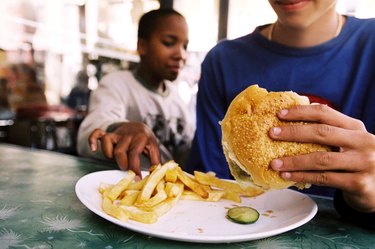
The digestive system includes the following: mouth, throat, esophagus, stomach, small and large intestines, liver, pancreas, gallbladder, and anus. All these organs need proper nutrients to function properly. Too little healthy foods and too much unhealthy foods can interfere with normal processes of your digestive system.
Organs Need Adequate Nutrients
Video of the Day
Cells organize and form tissues, which organize and form organs. All cells need adequate nutrients to do work. Without proper nutrients, the cells can die or fail to function properly. Your body also needs antioxidants – substances commonly found in fruits and vegetables – to neutralize free radicals, or highly reactive molecules, that can harm your cells. When free radicals attack the cells and impair them, they lose their ability to produce functioning enzymes -- specialized proteins needed in every facet of biological activity, including digestion and metabolic processes.
Video of the Day
Constipation
Fiber saves time and discomfort. Without adequate dietary fiber, you increase your risk of constipation. You may experience straining, lack of bowel movement and difficulty eliminating hard, dry stools. You may also feel bloated. Fiber helps move the stool along the digestive tract. Without it, stool may move slowly, allowing the large intestine to over-absorb the water content, leaving the stool dry and hard. Although constipation is temporary, getting enough fiber in your diet, drinking plenty of fluids and exercise can help reduce your experience of constipation.
Diverticular Disease
Constipation increases the risk of diverticular disease. Diverticula are protruding pockets formed from the colon. These pouches form because the muscles of the colon have difficulty passing stool along the tract and must use more force. People who eat a high-fiber diet have a decreased risk of developing diverticula compared to people who eat less fiber in their diets. Diverticula can get infected, resulting in diverticulitis, or inflammation of the diverticula. Symptoms of diverticulitis include constant ache in the lower left side of the abdomen, constipation and diarrhea, bloody stools, nausea, fever and vomiting. Diverticulitis can become serious, requiring hospital admission.
Gallstones
Eating too much high-fat and cholesterol foods, and not enough of a high-fiber diet, can increase your risk of gallstones. Gallstones are small solid substances that form in the gallbladder, the organ that sits below your liver in your right abdomen. The solid substances are made from bile, a type of liquid that your liver makes. Bile contains bile salts, fats, cholesterol, proteins, bilirubin and water. Your gallbladder stores the bile. When your body needs bile salts to break up fat, the stored bile gets released. People exhibiting the following symptoms need to seek medical attention immediately: pain in the right upper abdomen, in the back between the shoulder blades and below the right shoulder for more than five hours; nausea and vomiting; fever or chills; changes in skin color to yellow or in whites of the eyes; and grayish stools.
Is this an emergency? If you are experiencing serious medical symptoms, please see the National Library of Medicine’s list of signs you need emergency medical attention or call 911.